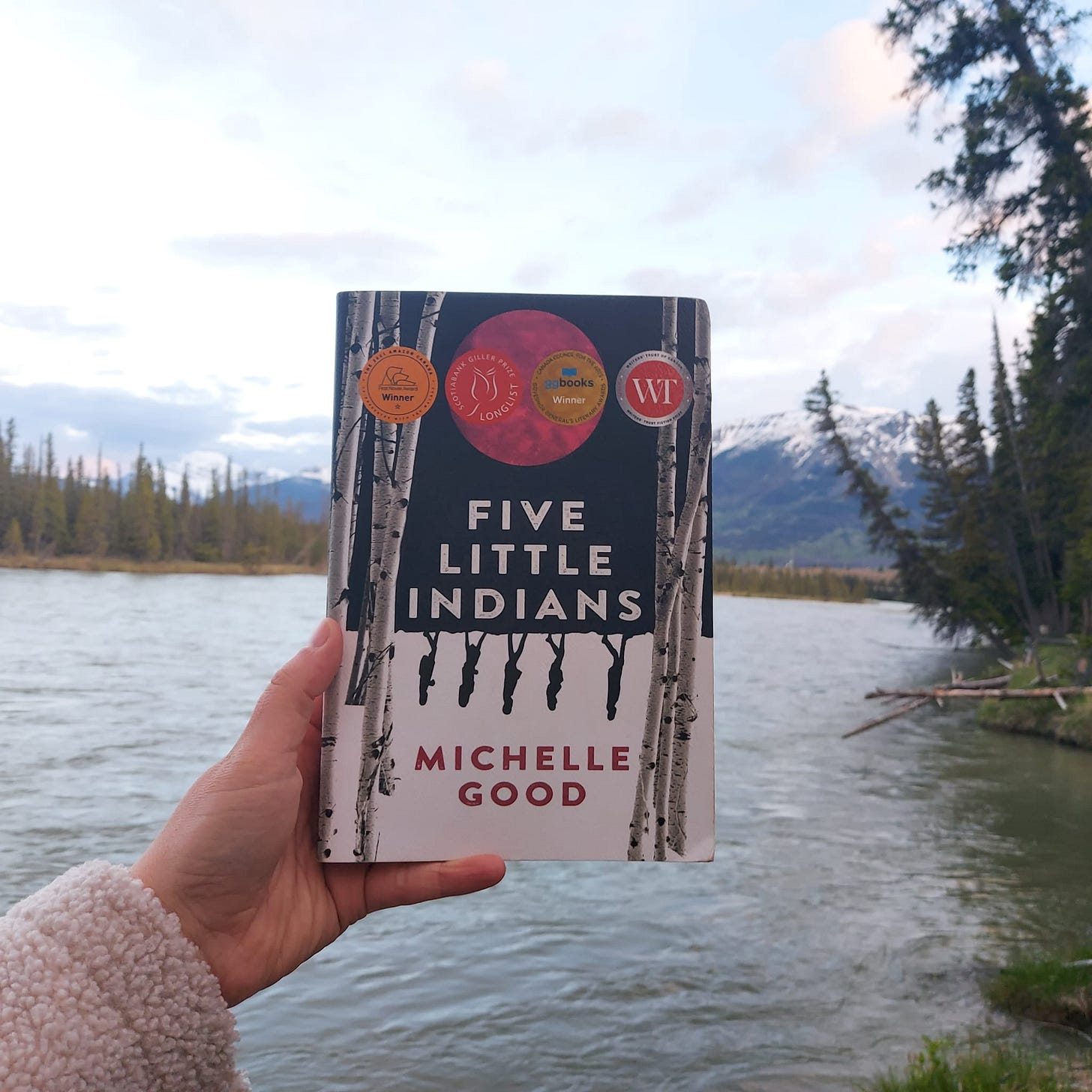Welcome to Bookmarked, a weekly newsletter that tracks my journey as I read one book from every country. If you’ve found your way over here but are not yet subscribed, let me help you with that:
Michelle Good is a Cree author and a member of the Red Pheasant Cree Nation in Saskatchewan. Her debut novel, Five Little Indians, won or was shortlisted for all the major Canadian literary prizes—the Scotiabank Giller Prize, the Governor General's Award for Fiction, and the Rogers Writers' Trust Fiction Prize to name a few. It tells the story of five Indigenous Canadians as they struggle to find their place in Vancouver after leaving residential school. Good’s mother attended residential school.
You may have read about the discovery of the remains of hundreds of children at the sites of now defunct residential schools in British Columbia and southern Saskatchewan. These schools were part of a state-funded, church-run system that took Indigenous children from their families from 1883-1996 and forced them to live in boarding schools, where they were prohibited from speaking their own languages and engaging with their own cultures, often through violence, in order to assimilate them into the dominant Canadian culture. Disease was widespread, and so were sexual, physical, and emotional abuse.
Five Little Indians is set in the 1960s and follows a linear progression, often leaping forwards several years in time. Over the decades, the lives of Kenny, Lucy, Maisie, Clara, and Howie come together and apart as they try to find a way forward from the trauma they suffered during their years at the Mission.
The first character Good introduces us to is Kenny, a courageous boy who successfully escapes the Mission but struggles to find a sense of place in the world. Though he’s hard-working and kind, Kenny moves restlessly through jobs and struggles to commit—even to those he loves. There’s Lucy, who is sent to Vancouver when she turns sixteen and, after a nasty encounter with a local pimp who preys on recently released residential schoolgirls, lands a job cleaning a filthy motel. Lucy’s plans to become a nurse are derailed when she rekindles things with Kenny.
Then there’s Maisie, who was sexually abused by a priest at the Mission and now, having internalised this experience, self-medicates and actively pursues degrading and dangerous sexual encounters. There’s Clara, who gets involved with the American Indian Movement at the time of the Wounded Knee occupation, only to get injured and wind up staying with a remote Indigenous healer who teaches Clara how to channel her anger into action. And finally there’s Howie, who ends up in prison after almost beating one of his abusers to death and must learn to re-enter society for a second time when he is released.
Lucy leaned back in her chair, hands folded in her lap. “They call us survivors.”
“Yeah.”
“I don’t think I survived. Do you?”
Good’s characters are complicated, well-rendered people and their braided storylines paint a devastating picture of how they end up making the choices they do. I was particularly interested in the many secondary characters who can’t understand how these people’s experiences continue to inform their life choices. Like Maisie’s boyfriend, Jimmy, who is Indigenous but whose parents escaped to Seattle when the school mandates came into effect. “His parents told him about it, because they had gone to one of the Indian schools, but he didn’t really understand,” says Maisie. “How could anyone?” Kenny’s relationship with his daughter, who will not forgive him for continuing to take off without warning, is equally gut-wrenching.
It’s hard to describe the experience of reading this book. It taught me so much about the horrors of residential schools, the lunacy of expecting these children to integrate into society without support, and the ongoing repercussions of colonialism. I put it down to cry more than once. An impactful and very accessible book which I’d implore anyone to read.
Five Little Indians by Michelle Good (Harper Perennial, 2020)
More books by Canadian authors:
Ghost Lake by Nathan Adler
Washington Black by Esi Edugyan
The Imago Stage by Caroline Georges, tr. Rhonda Mullins
Scarborough by Catherine Hernandez
Remnants by Céline Huyghebaert, tr. Alesia Jensen
Glorious Frazzled Beings by Angélique Lalonde
The Son of the House by Cheluchi Onyemelukwe-Onuobia
How to Pronounce Knife by Souvankham Thammavongsa
Fight Night by Miriam Toews
The Strangers by Katherena Vermette
What have you read recently?
If you’ve read a brilliant book in translation or you’d like to pass on a recommendation, I’d love to hear about it! For this project, I’m focussing on contemporary fiction and short stories, with a preference for female authors—but I’m always happy to venture further afield for a good recommendation.
You can get in touch by replying to this email or leaving a comment. I’ll be featuring your recommendations in upcoming newsletters, and I’ll keep a growing list here.
Bookmarked is written by Tabatha Leggett. If you know someone who would enjoy this newsletter, please consider forwarding it to them! And if you’d like to support me by buying me a coffee, you can do so here:





As a Canadian who loves CanLit, I was a little surprised to find I haven’t read any of the books in this post, though I am familiar with some of these titles. I have read other books by some of the authors on your list, though. Thanks for adding to my TBR!
One to add to your list above is Rabbit Foot Bill, by one of my favourite Canadian authors, Helen Humphreys. She’s written many others, all wonderful, but not all are set in Canada, as Rabbit Foot Bill is.
How fitting that I should be reading this review whilst in Canada. I learnt a lot about Indigenous issues over the past few months after a trip to the US, and now Canada, so this will be another education.